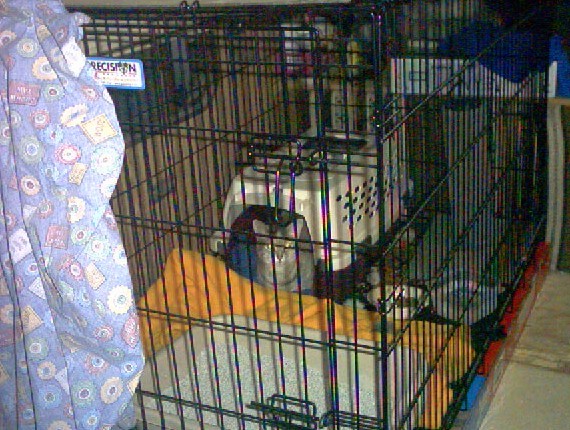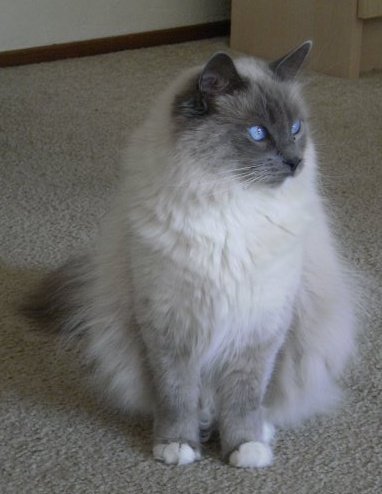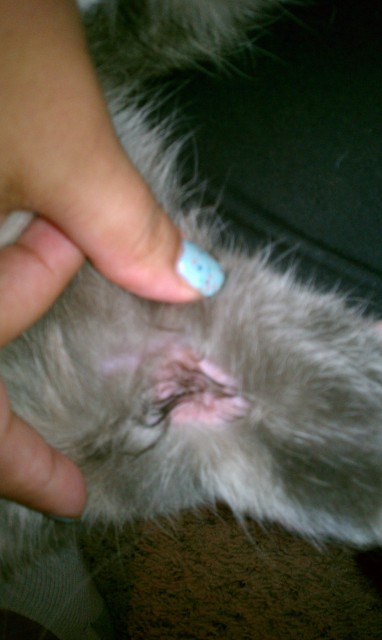QuestionQUESTION: My name is jeff and I rescue stray cats. I recently rescued 6 kittens that were left to fend for themselves. I'm guessing from experience that these cats are around 6 to 8 months old. They have appeared healthy up until about a month ago when I noticed swelling in the neck glands of 4 of the six. I took them to the vet. He put them on antibiotics. They've been on 3 different antibiotics with moderate results. Now one of them appears to have a cold sore like sore in the leftside of his mouth. The swelling has gone down in their throat glands some, but not all the way. What's your opinion on this?
ANSWER: Hi Jeff. A few things come to mind. Did you have the kittens tested for the feline leukemia and feline AIDS viruses? These are two contagious illnesses that can cause swollen glands and sores in the mouth, especially AIDS. And since they're viral, they can't be cured with antibiotics, although antibiotics tend to improve an infected cat's condition a bit, since bacterial infections often are partially to blame for some of the symptoms. Tests can be run in-house and will give you results in about 10 minutes.
Another good possibility is calici virus. This is a highly contagious upper respiratory virus. Around 70-80% of cats become infected with this disease, and once infected, they become carriers for life. Depending on the strain of calici virus the cat contracts, it can cause a range of symptoms. Some of the more serious strains cause painful mouth sores. Again, because it's a virus, it's not curable, but antibiotics can help control the bacteria that usually invade the body while it's busy fighting the virus. Most calici infections run their course in about 7-14 days (some take longer), and then the infection goes dormant. The cat becomes a carrier, but the infection may become active during times of stress throughout the cat's life.
It's a good idea to supplement cats with suspected calici (or any virus) with l-lysine. Lysine is an amino acid that's needed to build antibodies that fight viruses. You can use a supplement made especially for cats, such as Viralys or Enisyl-F products (pastes, gels, powders or cat treats), or you can buy tablets from your pharmacy. The effective dose for a cat of this age would be 500mg a day. Most tablets for humans are 1000mg. Ideally, split the pill into quarters, then grind up a quarter and mix it into canned cat food, twice daily.
Finally, there could be a possibility that the sore may be an eosinophilic granuloma. This seems to be an immune-mediated condition. Inflammatory cells invade the skin and cause a granulated ulcer. When any type of inflammatory process is present in the body, swollen glands are a possibility. However, it would be unlikely that all the kitties would suffer this condition. So I would suspect it's something of a contagious nature.
My final thoughts would be that if the kitties haven't been tested for leukemia and AIDS, start there. If the tests are negative, start them on some lysine and perhaps a pet multi-vitamin that contains vitamin C. Chances are that if they've been on 3 antibiotics, but it hasn't cleared up, it's viral.
Best wishes!
Jessica
---------- FOLLOW-UP ----------
QUESTION: Thank you for your speedy response. I got the paw gel Saturday. It says for healthy immune systems. Lots of amino acids and other good stuff. They seem to like it. I also bought some foods with healthy ingredients like science diet and that new all natural blue food. My wife has them at the vet as we speak to check for felv/fiv. I guess we'll soon. I have about beat myself up over the possibility of felv/fiv to the point that I'm actually having anxiety attacks myself. I shelter anywhere from 30 to 40 cats/kittens that up until now "seem" healthy.
I was wrong about one thing. They've only been on 2 antibotics the later being clavamix. I started them on those around the first of this month. Like I said, they seem better just not what I would consider top notch. They are playful and the are eating. They don't seem to be gaining alot of weight like their siblings, but they're not losing weight either. I just hope they are ok.
ANSWER: Don't beat yourself up about it! I know how you feel. I have been through all those same emotions. But from one rescuer to another, when you're in this line of work, you have to remind yourself - these kitties come from very questionable backgrounds. Many of them are malnourished, have had no vaccinations, have been exposed to loads of disease...they're hard luck cases. It's an unfortunate fact of that when you deal with 30 or 40 cats who've probably had a very poor start, you're bound to run into some kitties who are just not going to thrive, and who may be disease carriers. And there is no way to predict which ones they will be. So we do our best. I learned the hard way to test every cat for FeLV and FIV before they were allowed contact with the rest of my cats. Lost three entire foster litters because one little kitten came in who was too young to test when I rescued her. So you are certainly not alone! I hope the tests have come back negative, and that the babies are just late bloomers!
---------- FOLLOW-UP ----------
QUESTION: Looks like a negative on felv/fiv. One was diagnosed with calcivirus and the other has stomachtitis. The vet gave me antobiotics and a steroid pill to give the one with stomachtitis. Unfortunately I am sure the others now have the calcivirus being there is no known cure. I pray it doesn't cause serious problems for my healthy cats. What is your experience with it?
AnswerWell, if your other cats are up-to-date on their vaccinations, you can hope that they will dodge the calici. Typically, a vaccine against calici virus is rolled into their distemper shot. The catch? There are many strains of calici, and the vaccine is not effective against some of the strains. If this litter has one of those strains, chances are good it will spread to any cats who haven't yet caught it. But remember, most cats do contract calici. Your other cats could very well have been infected already. In fact, potentially, this litter caught calici from one of your other cats, since calici can be shed even when the virus is dormant. Even if your other cats seem to get sick now, it could be a dormant infection resurfacing due to the added virus they're being exposed to. Bottom line - don't make yourself sick worrying over it. There's no telling who had it first, and it's generally not a life-threatening condition.
As for the stomatitis, that news is a little worse. Stomatitis is a very severe, painful oral disease, and juvenile stomatitis offers even less hope of normalcy for a few years. The antibiotics and steroid may stave off the inflammation for now. But the only known cure for stomatitis is to remove the cat's teeth, ALL OF THEM, except for the canines and incisors in some cases. That's because the stomatitis is an immune-mediated disease caused by a reaction to bacteria in the mouth. Bacteria abound in plaque, which tends to build up on the molars and premolars. The immune system attacks the soft tissues of the mouth anywhere that bacteria have intense contact with, starting at the gumline. As more inflammation builds, ulcers can spread to the roof of the mouth and tongue as well. The only way to stop this overreaction is to either suppress the immune system using steroids, or to remove the teeth that are harboring all the bacteria.
The kitty would need to be an a pretty good dose of steroids for life. Those can cause diabetes, weight gain and inability to fight infection. It's not something you want to keep your cat on unless you have no other choice.
Removal of the teeth is a one-shot deal. You have the oral surgery, and the ordeal is behind you. The cat can still eat whatever you choose to give them - wet food, dry food, either is fine. Two of my cats have had every tooth removed, canines and all, and they eat dry food every day. I only wish I'd had their teeth removed sooner to save them the pain! Definitely think about it, do some more research, but in the end, I believe you'll have no choice. The kitty will simply be in too much pain to continue on with the cover-up treatments.
I'm glad the kitties are FeLV/FIV-! Thank goodness for that one! After that, everything else is a piece of cake!

 cat disappeared
Question
pusscat at home
My cat came to me at 6 months
cat disappeared
Question
pusscat at home
My cat came to me at 6 months
 vacation house and taking cat
Questionour permanent home is on a 3 acre semi wooded p
vacation house and taking cat
Questionour permanent home is on a 3 acre semi wooded p
 my kitty Valentine
QuestionQUESTION: my kitten is 3 month old I only had h
my kitty Valentine
QuestionQUESTION: my kitten is 3 month old I only had h
 Please help
Questionmy cat
QUESTION: Hi,
I have a Ragdoll ca
Please help
Questionmy cat
QUESTION: Hi,
I have a Ragdoll ca
 Small bald spot?
Question
Chibi arm
I was playing with my almost
Small bald spot?
Question
Chibi arm
I was playing with my almost